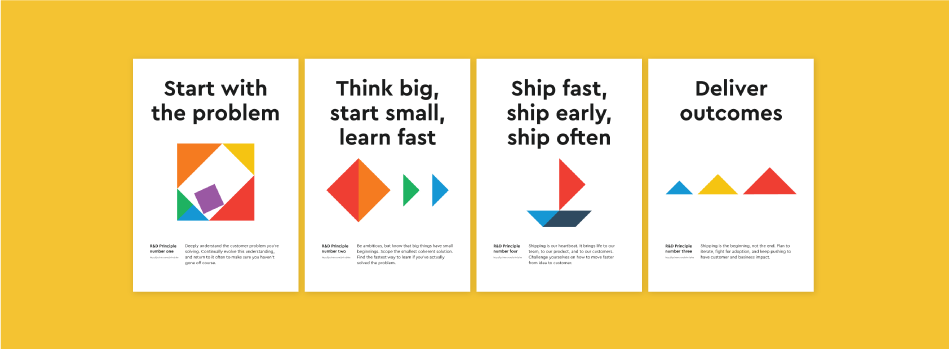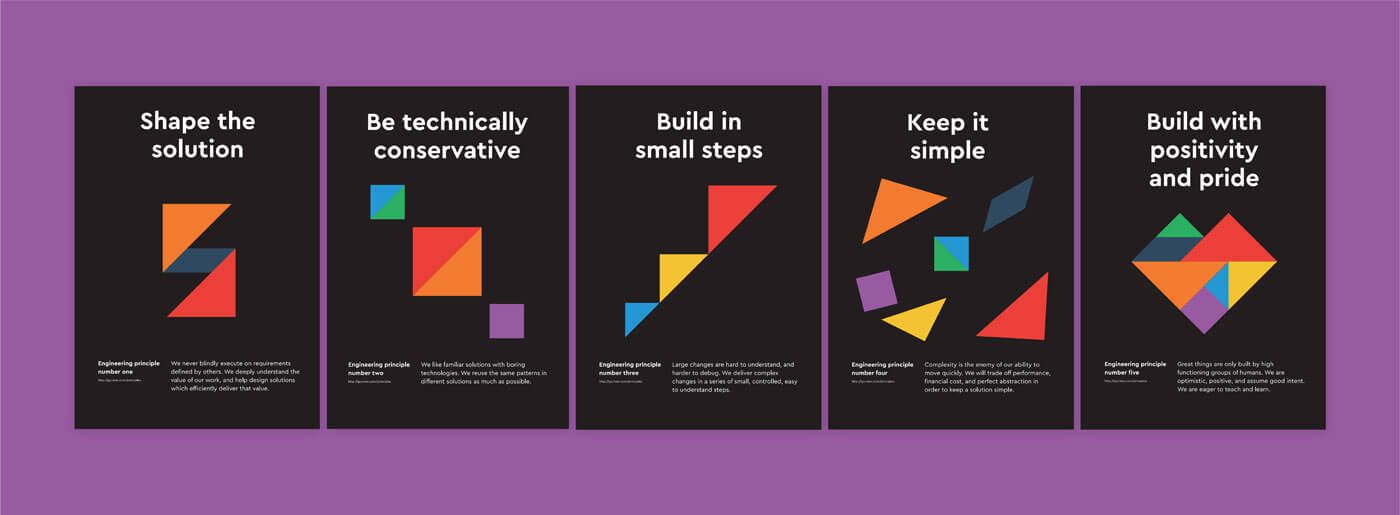
Introducing Intercom’s product principles: A series exploring the beliefs that shape what and how we build
Intercom is built on principles.
I mean that in a very practical sense: PMs, Designers, and Engineers at Intercom use our R&D principles every single day to guide their decision-making. Having clear principles keeps everyone pointed in the same direction, and empowered to move quickly and with confidence.
“Defining and distilling these principles has been one of the biggest contributors to our ability to consistently build great products at scale”
This is why we’ve decided to share these principles with you. We’ll do that here over the coming weeks and months, exploring the thought process behind each one. Defining and distilling these principles has been one of the biggest contributors to our ability to consistently build great products at scale – we hope you find them as useful as we have.
What are product principles and why do we need them?
We didn’t always have product principles. In a sense, building a product is simply a series of decisions, and in the early days, like most companies, we made many product decisions based on shared intuition and context.
But as we’ve scaled, codifying our approach to decision-making has been critical. Think about what happens when new folks who lack all of that historical context join the company; without principles in place they can feel disempowered, lost, or even totally misaligned. Now consider what happens when those misaligned people start onboarding even newer folks, compounding misalignment. It becomes frighteningly easy to lose any sense of overall consistency and momentum across teams.
“Principles: a set of fundamental truths or propositions that serve as the foundation for behaviors that give you the results you want”
Hence the need for principles: a set of fundamental truths or propositions that serve as the foundation for behaviors that give you the results you want.
That’s a bit of a mouthful – the kind of word salad you end up with when you try to compress a big idea down into a single sentence. So in even simpler terms, a principle is a shared idea that helps teams do good work together.
And principles are not just for onboarding new hires. As teams grow, they need structured ways to:
- Repeat their successes
- Avoid repeating their mistakes
This also means that principles may need to be updated as you learn more – our current set of Intercom R&D principles is the third major iteration since we first introduced them about eight years ago. We are constantly learning and improving, folding in what works better as we learn, and sharpening our stance.
Principles over process
We explicitly value principles over process. Many companies (Intercom included) have a clear process for building products. However, we’ve found that over-reliance on process consistently leads to lowest-common-denominator results.
A strong process can be great at preventing you from driving a project off the edge of a cliff. But great products, or fast progress, rarely come from blindly and dogmatically adhering to a set of instructions. This is not paint-by-numbers. What’s more, we haven’t hired hundreds of brilliant PMs, designers, and engineers just to ask them to unquestioningly follow a cheat sheet.
“If we can internalize our principles – the why behind the process – then we can start to make better decisions”
If we can internalize our product principles – the why behind the process – then we can start to make better decisions than the process dictates and even opportunistically skip stages, refine our approach, and improve how we work over time. Understanding the intent, rather than obeying a method, allows you much more freedom in how to execute. Principles are not rules – they exist to guide, not control.
Principles should not be truisms
Finally, great principles are not truisms. I sometimes see company principles that express reassuring sentiments like, “Make it delightfully simple.” A fine idea to be sure, but not much use when you’re wrestling with a gnarly decision, or struggling with how to approach a hard trade-off.
A good litmus test here is to flip the principle around to express the exact opposite and see if it holds up. If it’s not at least plausible (I can’t see “Make it horribly convoluted” gaining much traction), then it’s not really a principle, it’s a truism.
What are Intercom’s principles for building products?
I’m really glad you asked that, because I’ve been dying to show you these lovely posters we made.
R&D principles
Each of us in the R&D org works hard to understand, internalize, and enact these product principles. These are not just posters on the wall: we regularly refer to them when assessing and debating options. They actively guide how we work.

- Start with the problem
- Think big, start small, learn fast
- Ship fast, ship early, ship often
- Deliver outcomes
Product Design principles
We love principles so much, we also have discipline-specific principles for Product Design.

- Connected, modular systems
- Opinionated by default, flexible under the hood
- Follow fundamentals
- Make it feel personal
- What you ship is what matters
Engineering principles
We did the same for Engineering.

- Shape the solution
- Be technically conservative
- Build in small steps
- Keep it simple
- Work with positivity, pride and love
These more focused principles allow us to stay aligned on more detailed, function-specific aspects of product building. We sometimes even create principles for specific projects to get aligned on our approach up front.
Of course, these might work for Intercom and what we’re trying to optimize for, but not for you. However, we hope that sharing them and the thought process behind them will demonstrate the value of principles, and help you to shape your own.
Looking ahead
Over the coming weeks, we’ll publish a series of blog posts diving deep into each of the 14 principles above. Each post will be written by someone who actually applies them in their work each day – they’ll describe the thinking behind each principle, and provide specific examples of how we’ve put them to work at Intercom.
If these principles align with the way you work, take a look at our R&D team openings.







